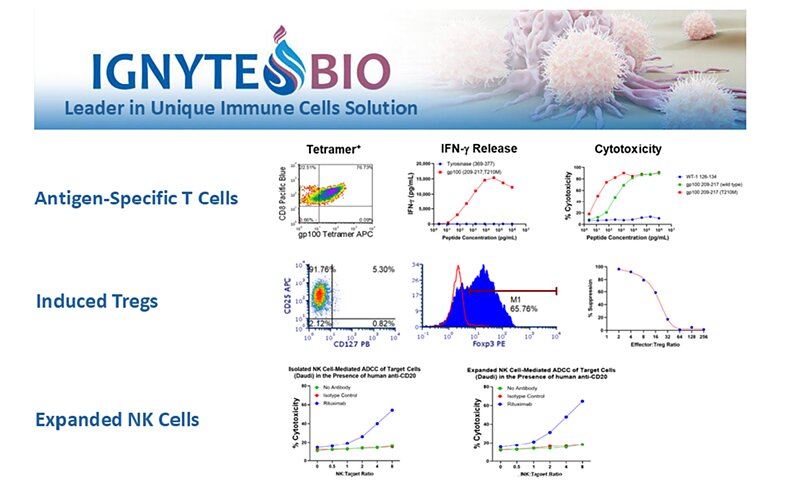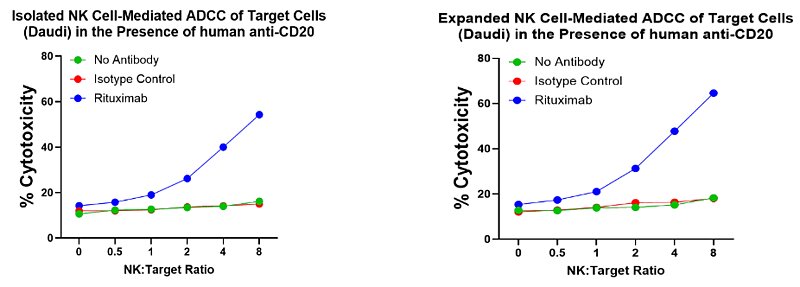Ignyte Bio: A Leader in Unique Immune Cells Solution
This blog post was written by Ignyte Bio. Ignyte Bio, headquartered in Seattle, WA, specializes in providing researchers with high-quality, well-characterized immune cells through their unique “4R” model. This model emphasizes accessible product data, recallable donors, instant purchasing and ready-to-use cell products, all aimed at enhancing transparency and efficiency in cell sourcing. Their offerings include a broad range of cryopreserved human PBMCs, isolated immune cell components, and Unique immune cells like Antigen Specific T cells, induced TRegs and Expanded NK cells. Their services are available on Scientist.com.

What are the “4R” Solutions to Cell Sourcing?
- Readily Available Data: Each product comes with donor and lot-specific data, accessible via certificates of analysis posted on the Ignyte Bio website for thorough review.
- Recallable Donors: Donors can be recalled at no extra cost, supporting reproducibility and further studies.
- Ready for Purchase: Real-time inventory is maintained on the website, allowing for immediate purchase and streamlined ordering.
- Ready to Use: Products include lot-specific phenotypic and functional data, enabling researchers to select the optimal cell products for their specific assays.
Available Cell Types
Ignyte Bio offers a diverse selection of cryopreserved human peripheral blood mononuclear cells (PBMC), their isolated components and in vitro generated cell types, including:
| T Cells (CD3, CD4, CD8) | Monocytes |
| B Cells | Monocyte-derived Dendritic Cells (DC) |
| Isolated NK Cells | B-LCL |
Specialized Immune Cell Products
Antigen-Specific T Cells (ASpecT)
- Produced through multiple in vitro stimulations using peptide antigens.
- Not immortalized or genetically modified, closely mimicking physiological T cells.
- Specificity is verified via cognate peptide/MHC tetramer binding and interferon-gamma (IFN-γ) secretion assays.
- Applications:
- Assessing antigen presentation (such as vaccine potency)
- Evaluating factors that modulate T cell responses, including:
- cytokines
- agents targeting co-stimulatory molecules
- checkpoint molecules.

ASpecT Product Line (CD4 and CD8)
| Anti-gp100 CD8 T Cells | Anti-MUC1 CD8 T Cells | Anti-CMV CD8 T Cells |
| Anti-HPV E7 CD8 T Cells | Anti-CEA CD8 T Cells | Anti-GAD65 CD4 T Cells |
| Anti-Tyrosinase CD8 T Cells | Anti-PSMA CD8 T Cells | Anti-GAD65 CD4 T Cells |
| Anti-MART-1 CD8 T Cells | Anti-NYESO CD8 T Cells | Anti-NY-ESO-1 CD4 T Cells |
Induced Regulatory T Cells (Treg)
- In vitro generation of iTregs allows for cost-effective, larger batch production, enhancing their applicability in immunology and oncology research.
- Ideal for Treg suppression assays, facilitating the evaluation of drug candidates in suppressing or inhibiting immune responses.
- Each lots exhibit induced Treg phenotypes: CD4+, CD25+, CD127 low/negative, significant Foxp3 expression, and a proven capacity to suppress T cell proliferation.

Expanded NK Cells
- Offered at a lower price point and in larger lot sizes compared to traditional NK cell isolation methods.
- High viability (>85%) and purity (>85%) for the CD56+, CD3- population.
- Comprehensive donor information, including FcγRIIIA-158 genotype, is included in each certificate of analysis.
- Cells are functional and ready for use immediately after thawing, with proven activity in direct cell killing assays (e.g., K562) and antibody-dependent cellular cytotoxicity (ADCC) assays. The figure below shows comparison of ADCC mediated by isolated vs expanded NK cells from the same donor
